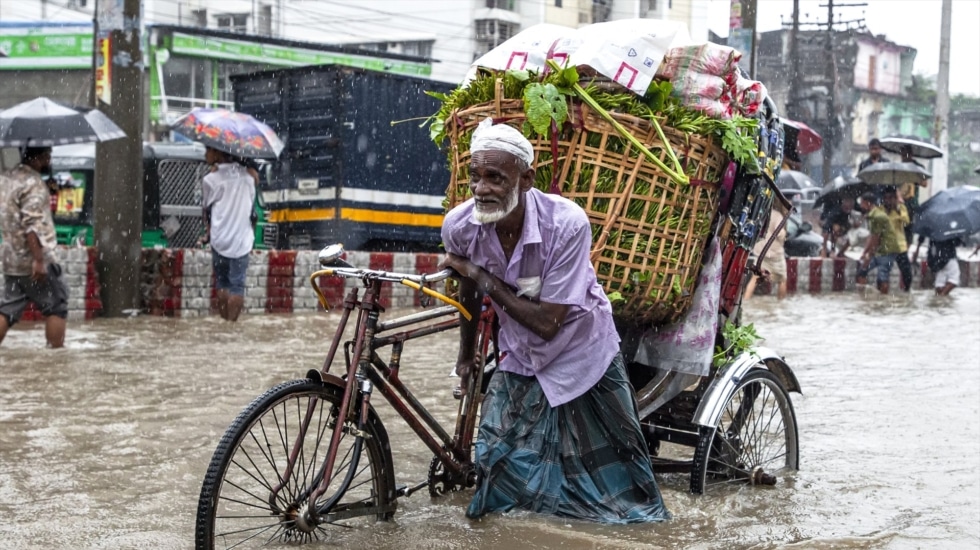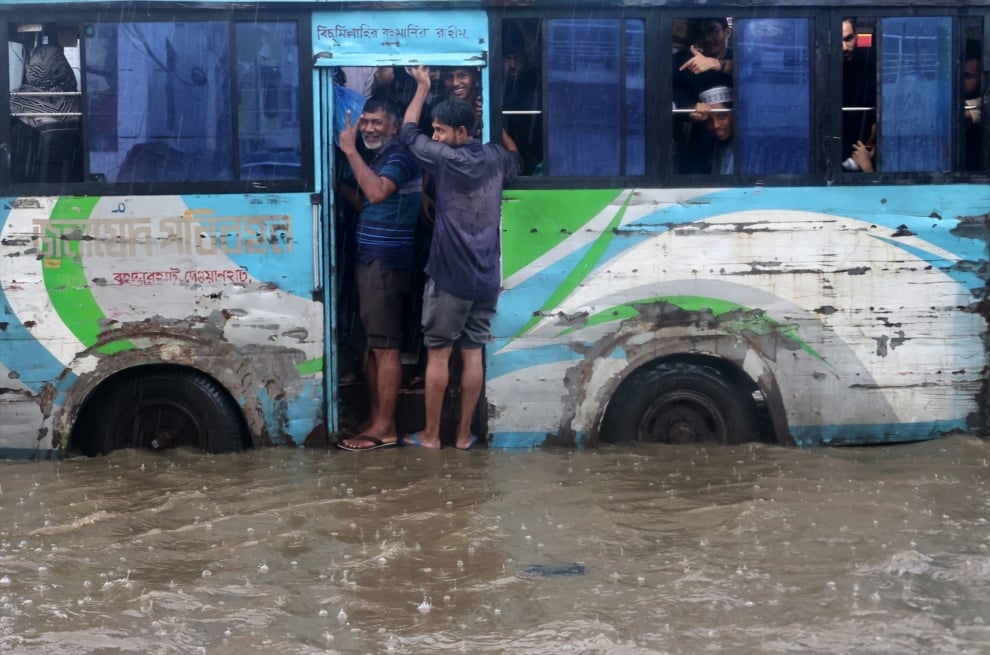

Flood in Chittagong, Bangladesh in August 2023.
Village Rekhamari, in Khulna Division (Bangladesh), will soon be under water. As across the country, anger over climate change is a reality here. Sohanur Rahman, representative of the Youth Climate Initiative Red Alert Campaign and A good friend of mine shared with me a heartbreaking encounter with an elderly woman from Rekhamari. Like the rest of the city, it will soon lose its habitat due to river bank erosion. Sohan, during his recent visit to Rekhamari, asks her, “How are you?” In response, the old woman smiles. He asks her again, “Why are you smiling?” The woman replies: “What else should I do, there is no one here who will listen to us or support us, soon I will lose everything I have.” We see millions of these “smiles” across the country, but behind each face is a story of fear, despair, rage and a sense of helplessness.
At the 28th World Climate Conference in Dubai, I will speak on behalf of the millions of children, women and men with stories like these who are already deeply affected by the impacts of the climate crisis. Bangladesh is one of the countries in the world most affected by climate change. This year alone the country has experienced three cyclones, something it has never experienced in the past, and as I write this article, a fourth cyclone is heading towards Bay of Bengal. Rising sea levels mean that many coastal cities are regularly underwater. Increasingly intense rains are flooding fields and pastures and destroying people’s livelihoods. It is estimated that by 2050, one in seven Bangladeshis will be forced to leave their homes due to the climate crisis.
The government of Bangladesh does not have enough financial resources to help all the affected, needy people.
The government of Bangladesh does not have enough financial resources to help all the affected, needy people. Beyond the investments that will be needed to arm ourselves against future climate damage, there is a need to expand disaster protection and move toward climate-resilient agriculture. Moreover, Bangladesh is just one of many countries in the Global South that find themselves in the same situation. They are among those most affected by the catastrophic impacts of the climate crisis, despite accounting for only a small portion of global emissions.
Polluting states such as Spain have historical and ongoing responsibilities. And the time to act is now. Together with my organization Action Against Hunger, I am campaigning for this at COP28.

Improving Global South countries’ access to climate finance
The international climate finance target of $100 billion a year agreed at multilateral climate negotiations has been repeatedly missed. As a result, important measures to mitigate the climate crisis and adapt to climate change are delayed and trust between parties is reduced. Although OECD countries recently announced that the 100 billion people target had finally been reached, this figure is no longer relevant given growing needs and the collective failure of rich countries to act on time. Ultimately, the unfulfilled contributions and loss of confidence in recent years must be redressed in order to move forward in negotiations to divest from fossil fuels.
Important measures to mitigate the climate crisis and adapt to climate change are delayed
In addition, access to climate finance must be made easier for countries in the Global South. The most vulnerable groups bear the brunt of the losses and damage caused by the climate crisis, and it is these communities that are often left out of global financial resources altogether. This must change. More climate funds need to be created in direct collaboration with local civil society, as local experts are often best placed to decide which solutions and innovations are appropriate for each context. They need to be supported so that everyone can access early warning systems and adaptation tools.
This also includes the implementation of the Loss and Damage Fund agreed last year. Since the last climate conference, there have been negotiations about which countries will pay and how much money, and how much affected countries will receive: it is a long process. However, the issue is urgent and funds are needed today, not tomorrow. This raises a very important issue: the management structure of the Loss and Damage Fund must be based on the principles of equality, inclusion and fairness. The poorest and least developed countries should have easy access to the fund.
Strengthening climate resilient food systems
For many people around the world, the climate crisis is first and foremost a hunger crisis. Heat waves, droughts and floods are intensifying, destroying fields, crops and water sources. By 2050, the climate crisis will leave up to 80 million people with less food on their tables (see IPCC Sixth Assessment Report, 2023). And our own food production is a huge contributor to the climate crisis: global food systems are currently responsible for a third of greenhouse gas emissions (see below). Special report on climate change and land resourcesfrom IPCC, Summary for Policymakers, 2019) However, sustainable alternatives do exist: approaches such as agroecology offer a way to combine community resilience with sustainability through diversified local and ecological production.
In Bangladesh, Action Against Hunger supports a program that helps farmers in flooded areas restructure their farming. Through our training courses, we help farmers restore damaged farmland and teach them innovative agroecological practices. We create ponds to collect water and build dams to control flooding. Fruits and vegetables are grown on the banks of ponds, in dams and on trellises on the surface of the water. Our project has significantly increased the productivity of farmers in the region.
Positive examples like these should be discussed in Dubai when governments talk about climate action in agriculture. Spain must ensure that this climate conference discusses agroecology as an independent and priority approach to climate protection and adaptation.
Our work proves it: we can make a difference. Together with communities affected by climate change, we are finding new ways to live in a changing environment every day. But to achieve this adaptation quickly enough around the world, we need shared political will and the provision of the necessary resources. We must redouble our efforts to adapt to climate change by doubling our resource allocation. Current funding for adaptation is insufficient. We are obliged to help people like the residents of the village of Rehamari, which would not be possible without our collective efforts. Spain and other polluting states bear the greatest responsibility in this regard. They could lay a crucial foundation for this at this climate conference in Dubai and instill a sense of hope.
__________
Mohammad Akmal Sharif He is the director of Action Against Hunger in Bangladesh. He has held this position since August 2022. He has worked in the humanitarian aid sector for 25 years and is involved in numerous regional and global initiatives to advance justice and human rights for isolated communities.
Source: El Independiente